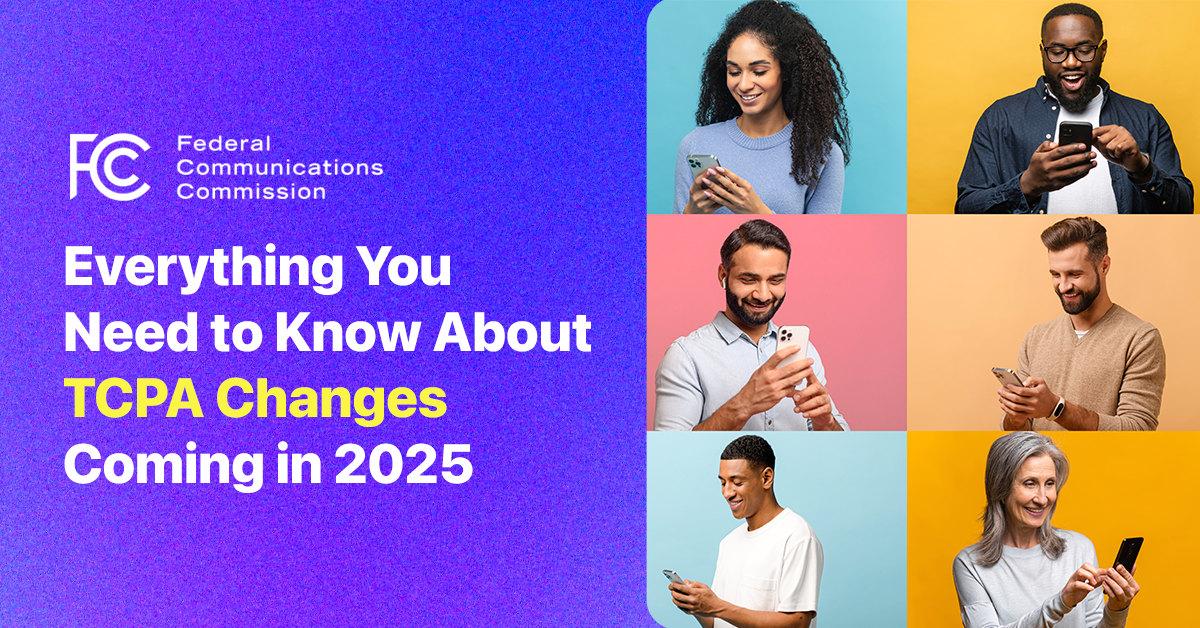Everything You Need to Know About TCPA Changes Coming in 2025

By - Eric Carriere
This year saw some pretty big changes to the Telephone Consumer Protection Act (TCPA).
First, in December 2023, we saw the Federal Communications Commission announce the closure of what it has long regarded as one of the most significant loopholes in the TCPA: Lead-generated communications. According to the agency, lead generators represent a huge percentage of unwanted calls and texts.
To address the issue, the FCC amended its definition of prior express written consent. Previously, lead generators and comparison shopping websites were able to obtain blanket consent to give someone's contact details to multiple sellers at once. Under the new rules, businesses must get consent from each individual seller — and that's not the only thing that's changed.
In this post, we're going to go over the FCC's amendments to the TCPA with regard to how they'll impact SMS marketing, starting with a brief primer on the act itself.
What Is The Telephone Consumer Protection Act?
The TCPA is a United States federal law that establishes clear legal guidelines around promotional communications. It provides organizations with rules around transparency, consumer rights, privacy, and consent. Alongside the Cellular Telecommunication Industry Association's Messaging Guidelines, it's one of the most important documents to know if you're running an SMS campaign.
What Changes Has The FCC Made to The TCPA?
The new rules, published in the Federal Register on January 26, 2024, hit three major notes.
First, the FCC made absolutely clear that the National Do Not Call (DNC) Registry does, in fact, apply to text messages. Prior to the ruling, the DNC didn't explicitly apply to text messages. It was more of an implicit assumption on the part of marketers.
As of March 26, 2024, businesses can neither call nor text anyone whose number is on the DNC Registry unless their communication falls under one of several exemptions. Given that it's been more than six months since the DNC changes were made, following them shouldn't be much of an issue. If you were following our guidance on SMS compliance, you should already be fine.
The FCC also added some new requirements for wireless service providers, effective as of July 24, 2024. Under the new rules, carriers are required to block text messages from any number or numbers upon notification from the agency of illegal texts from those numbers. We probably don't need to say much more about that change, since it's unlikely it'll have any effect on you.
The FCC also encouraged wireless providers to make email-to-text services opt-in as an additional measure to reduce the volume of fraudulent texts received by consumers. Unless you frequently send text messages from an email address, this recommendation probably won't have much of an impact on your business, either. Still, it's worth keeping in mind just in case.
Last but not least, there's the amendments to the definition of prior written consent. Here's where it gets a bit complicated. Because while the bulk of the ruling is already active, there's one amendment, known as the One-to-One Consent Rule, that doesn't come into effect until January 27, 2025.
Let's start by summarizing the overall ruling, listed under Closing the Lead Generator Loophole:
- Businesses are required to obtain a consumer's prior express written consent to solicit the consumer through robocalls or robotexts.
- The consent must be in response to "a clear and conspicuous disclosure to the consumer."
- The content of the promotional communications "must be logically and topically associated with the website where the consumer gave consent." A comparison shopping website may not, for instance, contact a consumer shopping for car loans about loan consolidation.
The One-to-One Consent Rule, as its name suggests, eliminates blanket consent from lead generators and similar businesses. Instead, they must obtain consent for communications with each individual seller. In response to concerns from the Small Business Administration and the law firm of Troutmin Amin LLP, the FCC provided a twelve-month implementation window for the new rule.
By the end of January 2025, the amended definition of prior written consent will, per the agency, read as follows:
"...an agreement, in writing, that bears the signature of the person called or texted that clearly and conspicuously authorizes no more than one identified seller to deliver or cause to be delivered to the person called or texted advertisements or telemarketing messages using an automatic telephone dialing system or an artificial or prerecorded voice. Calls and texts must be logically and topically associated with the interaction that prompted the consent and the agreement must identify the telephone number to which the signatory authorizes such advertisements or telemarketing messages to be delivered."
What Do The Changes Mean for SMS Marketing?
A few things. First and most importantly, the burden to prove compliance will not be on lead generators or comparison shopping websites. It's going to be on the businesses sending the text messages.
That means it falls on you to make sure any lead generation services you use are compliant. If you work with a non-compliant vendor, it's not the vendor that will get burned. No, it'll be your business.
Beyond that, however, things aren't going to change all that much. As we mentioned earlier, as long as you're taking the necessary steps to make sure your SMS campaign is compliant, you should be just fine. With that said, we still recommend that you seek professional advice if you have any specific legal questions related to the TCPA, the DNC Registry, or any other compliance guidelines around promotional messaging.
In the meantime, if you're looking for a platform that makes compliance painless, Meera can help. Our AI-powered platform is built from our experience managing thousands of successful SMS campaigns — we know exactly what you need to do to succeed.
Talk to an AI expert at Meera today to get started.


.png?width=512&height=512&name=guru%20(1).png)

.png?width=199&height=109&name=salesforce-logo1-removebg-preview%20(1).png)


.webp?width=716&height=569&name=banner-img%20(1).webp)



